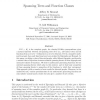Free Online Productivity Tools
i2Speak
i2Symbol
i2OCR
iTex2Img
iWeb2Print
iWeb2Shot
i2Type
iPdf2Split
iPdf2Merge
i2Bopomofo
i2Arabic
i2Style
i2Image
i2PDF
iLatex2Rtf
Sci2ools
108
click to vote
COMBINATORICS
2002
2002
Spanning Trees and Function Classes
If G = Kn is the complete graph, the classical Pr
Related Content
| Added | 17 Dec 2010 |
| Updated | 17 Dec 2010 |
| Type | Journal |
| Year | 2002 |
| Where | COMBINATORICS |
| Authors | Jeffrey B. Remmel, S. G. Williamson |
Comments (0)

